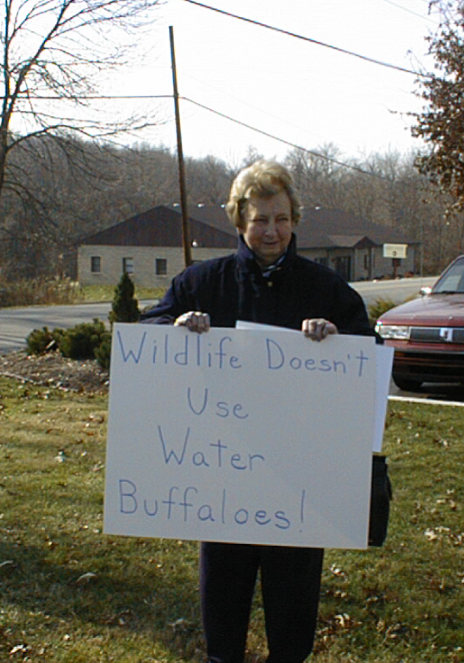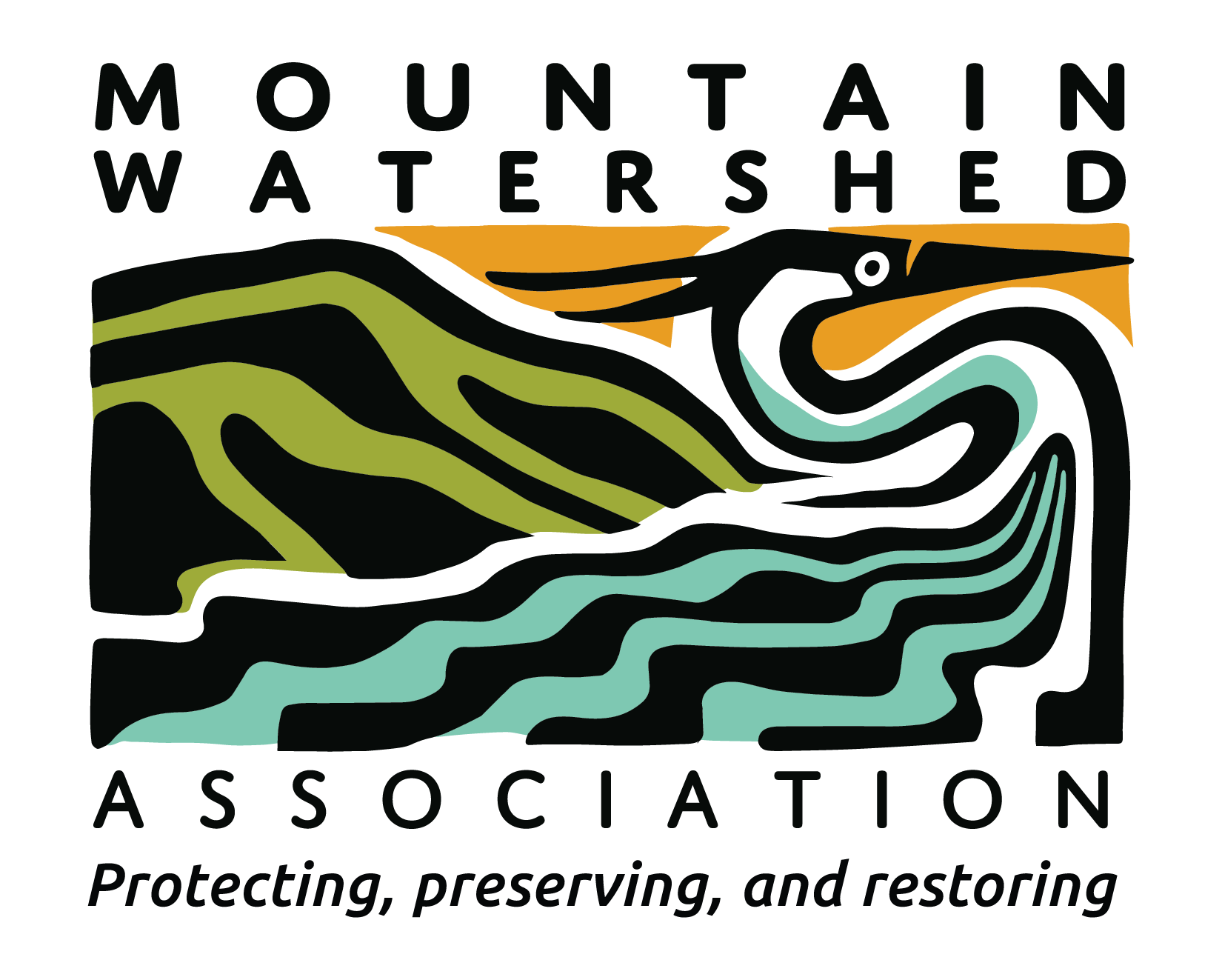
OUR STORY
Like many grassroots groups, Mountain Watershed Association began its life around a kitchen table. The organization was founded in 1994 to oppose an underground coal mine proposal in the Indian Creek Watershed in the Laurel Highlands of Southwestern Pennsylvania. MWA’s input and organized opposition resulted in the denial of the permit. MWA’s board of directors and dedicated community members realized that to restore the watershed to a viable community, they would have to address the legacy of more than 150 years of extraction and disinvestment in our rural Appalachian region. Since then, MWA has restored more than 70 percent of the Indian Creek Watershed and prevented countless sources of additional pollution in the broader Youghiogheny River Watershed. The organization has expanded to 16 full-time employees, a 20-person volunteer Board of Directors, and more than 2500 members and supporters.
OUR MISSION
Mountain Watershed Association is a non-profit, 501(c)(3) organization with the mission to protect, preserve and restore the Youghiogheny River watershed and its broader communities through conservation, recreation, education, and advocacy. Our organization is unique in that we pursue on-the-ground restoration of past environmental damages while we advocate to protect the watershed from new sources of pollution, primarily caused by fossil fuel development. We achieve our mission through a variety of initiatives including abandoned mine drainage remediation, water quality monitoring, trail development, educational programming, grassroots organizing, and legal advocacy.
Our Vision
MWA aims to empower communities both locally and downstream to transition towards sustainable, resilient, equitable economies and healthy environments where all beings mutually support each other. We work towards a world where we all act as if what affects one of us affects all of us, because that’s how watersheds work.
We Value:
Grassroots Empowerment: We believe we must collaborate with and uplift our diverse communities through grassroots engagement and education.
Environmental Justice: We believe that every member of our community deserves equitable environmental protections and access to clean water.
Interdependence: We believe that, just like watersheds, what affects one of us affects all of us, so our local actions can have global impact.
The History of MWA
Founding
1994
Mountain Watershed Association (MWA) was founded by community members around a kitchen table to fight a coal mine proposed in the area. They successfully defeated the proposal, protecting the watershed from continued damage at the hands of the coal industry.
1998
MWA developed a Comprehensive Restoration Plan, which revealed more than 130 abandoned mine discharges, 9 deep coal mines, and 60 strip coal mines within the 125 square miles of the Indian Creek Watershed.
2000
The Western Pennsylvania Conservancy transferred two rail-to-trail sections they owned in the Indian Creek Valley, beginning work on a 19-mile hike and bike trail that follows Indian Creek to the Youghiogheny River.
2001
MWA installed our first water treatment system, which collects two underground mine discharges, and relocated a 70,000 cubic yard coal refuse pile from the abandoned coal town of Sagamore.
2001
MWA completed the first Indian Creek River Conservation Plan to establish guidance for how to improve the watershed for decades to come.
2003
MWA successfully petitioned the international Waterkeeper Alliance to become the Youghiogheny Riverkeeper.
2008
MWA installed a 10-acre water treatment system to address the Kalp discharge - responsible for over 40% of the total pollution load in the Indian Creek watershed.
2009
MWA helped to secure the listing of Laurel Hill Creek on American Rivers’ 2009 Most Endangered Rivers list. This listing garnered national attention for the water quantity issues in Laurel Hill Creek, a small tributary of the Youghiogheny River, and likely played a role in the denial of a permit application for a water bottling plant in the watershed. We actively opposed issuance of this permit.
2012
MWA began the Youghiogheny River Comprehensive Water Quality Monitoring Project, a water sampling plan covering the Yough River basin from Maryland to the mouth near McKeesport, Pennsylvania.
2013
MWA trained over 100 people in our Marcellus Citizen Stewardship Project to provide baseline water quality data and identify impacts from shale gas drilling.
2014
MWA fundraised and built the Donegal Bridge to connect two sections of trail separated by Indian Creek.
2014
MWA started the Direct Support Fund to provide small grants to grassroots groups and advocates working toward social change on environmental justice, shale gas and petrochemical issues. Since 2014, the Direct Support Fund has awarded over $364,000 to 171 grassroots projects.
2016
The proposed Curry Mine was officially defeated after 8 years of community opposition and legal appeal.
2017
In February of 2017, Mountain Watershed Association (MWA), Clean Air Council (CAC) and the Delaware Riverkeeper Network (DRN) filed a legal appeal of the Mariner East 2 permits issued by the Department of Environmental Protection (DEP). After over a year of litigation the case was settled in early August 2018. This article details the outcomes and significance of the settlement that was achieved between the environmental groups and the DEP.
2018
In 2017, DEP permitted the 3000-acre Rustic Ridge underground mine, which borders the old Kalp and Melcroft workings. We attempted to prevent this development by filing an appeal of the permit, as breaching the abandoned mine workings could render our treatment systems useless. In January 2018, we secured a precedent-setting agreement with the company that forced them to increase the barrier between the new and abandoned mine workings, among other stipulations.
2018
MWA completed a 4.3 mile section at the southern end of the watershed that extends through the Indian Creek Valley Gorge and ends at the Youghiogheny River across from the Great Allegheny Passage.
2019
MWA achieved 70% restoration of Indian Creek, reducing the total miles of impaired streams in the watershed from 47 to 14.
2020
MWA engaged the services of the Western PA Conservancy to conduct electrofishing surveys at 14 sites in the Indian Creek watershed, which documented the improvements of the treatment systems allowing for native trout to survive and thrive. Eric Chapman, Director of Aquatic Science at Western Pennsylvania Conservancy, noted that the 13” wild brook trout that was found during our survey was the largest he had seen in his 15 years of surveying over 1,000 miles of streams.
2020
In 2020, Mountain Watershed Association launched its Nurdle Patrol initiative, which monitors plastic pollution in our waterways with a focus on monitoring potential impacts from Shell’s new ethane-cracker plant in Beaver County.
2021
MWA completed the rehabilitation of the Gallentine AMD Treatment system, which decreased the total iron and ferrous iron load entering Indian Creek from 16 mg/l to approximately 1 mg/l.
2021
MWA completed the Indian Creek River Conservation Plan - The Sequel, creating a prioritized plan of action for how to improve the watershed community for years to come.
2023
The Steyer Bridge on the Indian Creek Valley Trail was rebuilt, along with the trail leading to the bridge, making another mile of progress on the trail!
2023
After years of community action by MWA, local groups, and environmental advocates, Invenergy LLC abandoned its proposal to build the Allegheny Energy Center near West Newton and the Youghiogheny River.
2023
MWA and partners completed the Youghiogheny River Conservation Plan, Part 1: Headwaters to Dunbar Creek. This plan is a comprehensive guide for state agencies, municipalities, boroughs and the public to manage the Youghiogheny River watershed.

